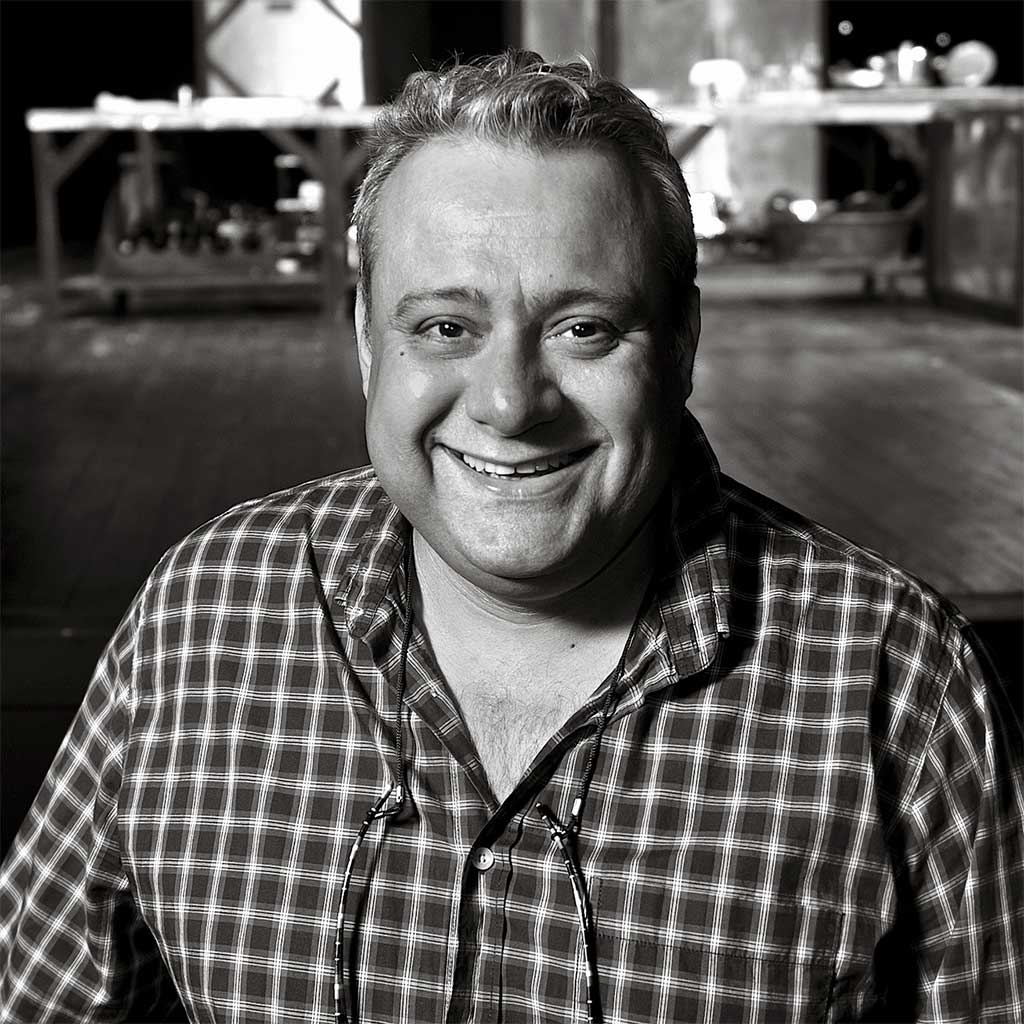
Purple White: We can define theatre as a passion for everyone who is interested in it, from actors to spectators. When did this passion reveal itself in you? When did you make up your mind to be a part of that world?
Engin Alkan: I have been a follower of theatre from a very early age and the fact that I took a decision to participate in it during my school years and the fact that it ultimately became my profession is actually a personal story of my existence. Learning about life and understanding it through “games” is an impulse which develops during childhood years in every person. Some people do not let this impulse die down against the serious problems, conflicts and harsh realities of life and continue their journey by choosing it as their guide to understanding. This circumstance, which is one of the root causes that underlie the passion for creating and performing art, is also a story of the processes I went through.
PW: You have worked in İstanbul Metropolitan Theatres as an actor, director and stage manager in many plays. These days, you have given us the chance to watch Şekerpare on a theater stage. When did the idea to adapt Şekerpare into a play come up?
E.A.: Şekerpare is a work that serves my desire to combine Public Theatre with Modern Theatre, which started manifesting itself in the play İstanbul Efendisi eight years ago and continued in plays such as Şark Dişçisi and Huysuz. We still enjoy many movies which left their mark on the 70s and 80s and were produced by Ertem Eğilmez and Yavuz Turgul under the label of Arzu Film. The theatric flavor of the public accord and the lingo that is so characteristic of this country which was captured in these films has always been of interest to me. Şekerpare was a project I had in mind for five or six years.
PW: Are you pleased by the interest Şekerpare has drawn? Or, more precisely, are you pleased with the attention theatre gets in our country?
EA: All of the tickets which are offered monthly were sold out within the first week. The spectators applause the plays with great admiration. The criticism and social media shares on them are also very positive. How can I not be pleased by this? The interest in theatre as a general concept however, is still much less than that of the counties where theatre has become a tradition even though the said interest seems to have risen in recent years due to the increasing population density in the city and the rest of the country.
PW: Şekerpare has an interesting feature: The characters in the play were very familiar to us in the era the movie came out and they are still very familiar to us. When we watch it, we say to ourselves, “Yes, there are people in real life who are very similar to these characters”. What do you think is the reason for this? Haven’t we changed even a little bit since those days in the past?
EA: Has the civilization itself changed at all since those days? I touched upon this issue in the article I wrote for the playbill. I will quote the part in question: “… Since the Age of Enlightenment, humanity has progressed at an unprecedented pace. Each a day, new ones are added to the inventions in science and technology that blow our minds and developments that prove the superiority of humanity over nature. However, at this staggering point the technologies on information, transport, space, genetics, medicine and war has reached, it does not seem possible to say that CIVILIZATION in its essence has progressed one bit. From the dark ages, humanity has still not been able to stop neither war, nor murder, nor rape. All over the world, we are a society of people who are repressed and exploited, who suffer and give up hope on the future in the worries of today. …”
PW: I have another question on Şekerpare. Şekerpare is a love story in its essence. The love that is present in the main plot is made up entirely genuine emotions. Do you believe that such romances exists in the real world or do you think that they are only in movies and plays?
EA: Romances of that kind do exist in real life but there is too little and they have to fight a difficult battle against the egoism, utilitarianism and self-seeking of humans. On the other hand, what makes them so precious is the fact that there is so little of them. I believe that apart from parental instincts, love is the only reality in which a person puts somebody else before herself and tolerates casting herself aside for the sake of another. In this sense, all people who give themselves completely up to love are very valuable.
PW: When it comes to what is happening between Ziver and Cumali, we see similar conflicts everywhere in real life. In fact, we go through them ourselves sometimes. When do you think this sort of injustice will end? What is the way for stopping it?
EA: Intentions wrap themselves up in goodness. Nobody starts out with a disposition to do injustice. But a person is always on his own side and always has a discourse that supports his own claim and believes in this discourse. This is as old as humanity itself and perhaps this conflict is inherent in humanity’s fate. What can provide balance for it are the justice systems of societies. Through them, people might suffer less damage. In other words, the antidote to injustice is a powerful justice mechanism.
PW: With your permission, I would like to ask some questions about you. Apart from your theatre work, you are an actor that has also had roles in movies and television series. Have you ever been a part of a TV series you wish did not end?
EA: I can say I regretted the end of every television series that fell victim to law ratings.
PW: Speaking of TV series, the sector of series is in state of a serious industrialization these days. Some viewers complain that there are no quality shows any more. TV series that are deemed of good quality are either cancelled or censored. What are your opinions on this? What do you think is the reason behind it?
EA: Broadcasting policies that ignore the demands of professional associations and unions and legal regulations that only focus on the needs of channels and production companies are the biggest reason behind this degeneration process.
PW: Besides your presence on stages and settings, you are also a voice actor. Your voice gives life to many characters and you have doubled as the Turkish-speaking voice of many popular foreign characters. You have been the voice actor for various characters from Papa Smurf to Sam in the Lord of the Rings trilogy. Which was the character you enjoyed the most while doing voiceovers?
EA: I enjoyed all voice acting work with welltranslated scenarios and proper studio conditions that also provided fair financial compensation for my efforts.
PW: Lastly, what are your opinions on the intense pressure on our lives and the incessant censorship in every area? What should be done to put an end to these?
EA: I think that another renaissance is necessary in politics, art, education and social fields.


